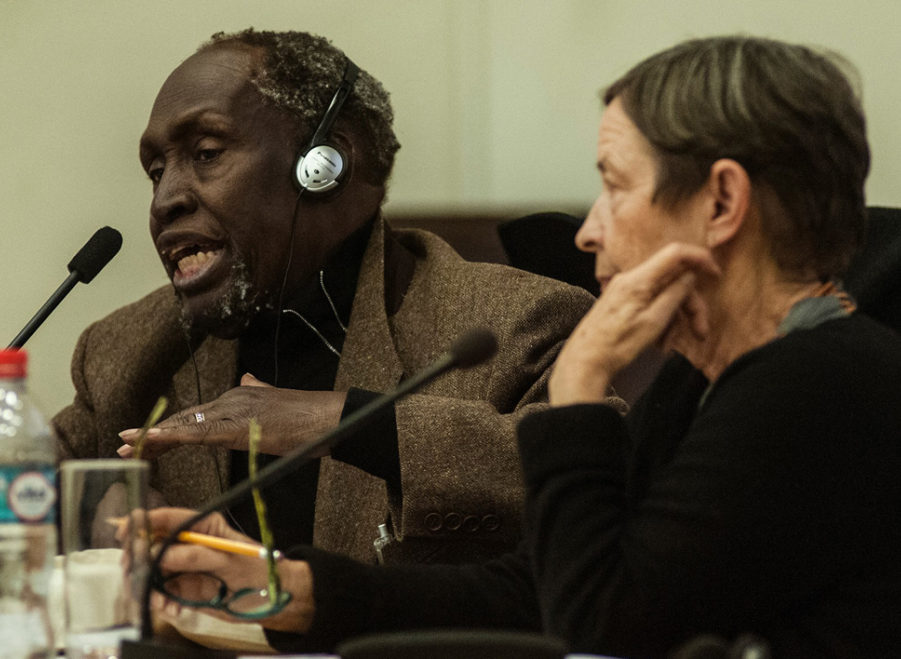Jazz Migrations
In this second episode of Ideas from Africa Anne Strainchamps and Steve Paulson, producers and hosts of To the Best of Our Knowledge, explore an alternate history of jazz, its origins, and global travels. In their conversations with musicians, jazz scholars, historians, Strainchamps and Paulson retrace the African origins of jazz as a genre that followed the transatlantic slave trade to the Americas and back to the Continent, albeit with a slightly different hyphenated identity that mirrors its diasporic influences. In highlighting jazz migration, Strainchamps, Paulson, and their guests spotlight the intricate relationship of jazz music to diasporic life, exile, migration, revolutionary struggles, and transatlantic slavery as the catalysts for the global dispersal of the sound and its pulse. The presenters take the listeners through a series of interviews interspersed with musical interludes and commentaries that contextualize each segment of the program.
In the course of their conversations, Stainchamps and Paulson are joined by musicians, historians, and jazz music scholars. In order of appearance, they include Meklit Hadero (Ethiopian-American jazz vocalist, songwriter, composer, and cultural activist), Valmont Layne (humanities scholar, musician, and jazz historian), Gwen Ansell (professor, South African jazz scholar, and researcher) and Ron Radano (professor, ethnomusicologist, and historian of US Black music).
The program begins with the jazz scene in Addis Ababa, Ethiopia, to highlight the fusion of continental and diasporic sounds in the music’s improvisational nature. In their conversations, Stainchamps and Paulson establish a link between the music as a distinct genre and the formation of hybrid cultural identities. The presenters proceed to examine jazz’s centrality to the revolutionary struggle of Black South Africans during the Apartheid regime. The segment emphasizes the sound’s contention with the structure of race and racial ideology, colonial subjugation, and economic oppression. The program ends with a closer look at the transcontinental/transatlantic origin of jazz as an off-shoot of a much deeper struggle, capturing the triumphal and tragic evocation of the sound in connection to Black life globally.
Special thanks go to Anne Strainchamps, Steve Paulson, and Craig Eley for the production of this episode. Anne and Steve joined CHCI in Addis Ababa in January 2019 as part of the Consortium’s African Humanities Initiative. This initiative is invested in supporting lasting opportunities for collaborative and interdisciplinary humanities research, publication, and community participation. Focusing on Africa and its global connections, this program draws upon CHCI’s strengths in bringing together multiple types of humanities organizations beyond those located in universities such as galleries, museums, libraries, archives, publishing houses, street theatres, public radio, and a host of other creative media. In 2019, CHCI hosted two large events bringing together leading scholars, practitioners, and early-career scholars from throughout Africa and the world. One of these events, conducted in French, was held in Dakar, Senegal, while the other, which provides the foundation for this podcast, was held in Addis Ababa, Ethiopia. Special thanks to Elizabeth Giorgis for having hosted and organized this workshop on Africa as Concept and Method. A similar event to take place in Maputo, Mozambique is in preparation.
More Episodes

Astonishing African Futures
This fourth and final episode of Ideas from Africa asks how do African science fiction writers tell stories about their own imagined future?

Decolonizing the Mind
This third episode of Ideas from Africa explores what "decolonizing the mind" portends for African writers, thinkers, and revolutionaries as well as its global significance in the twenty-first century.